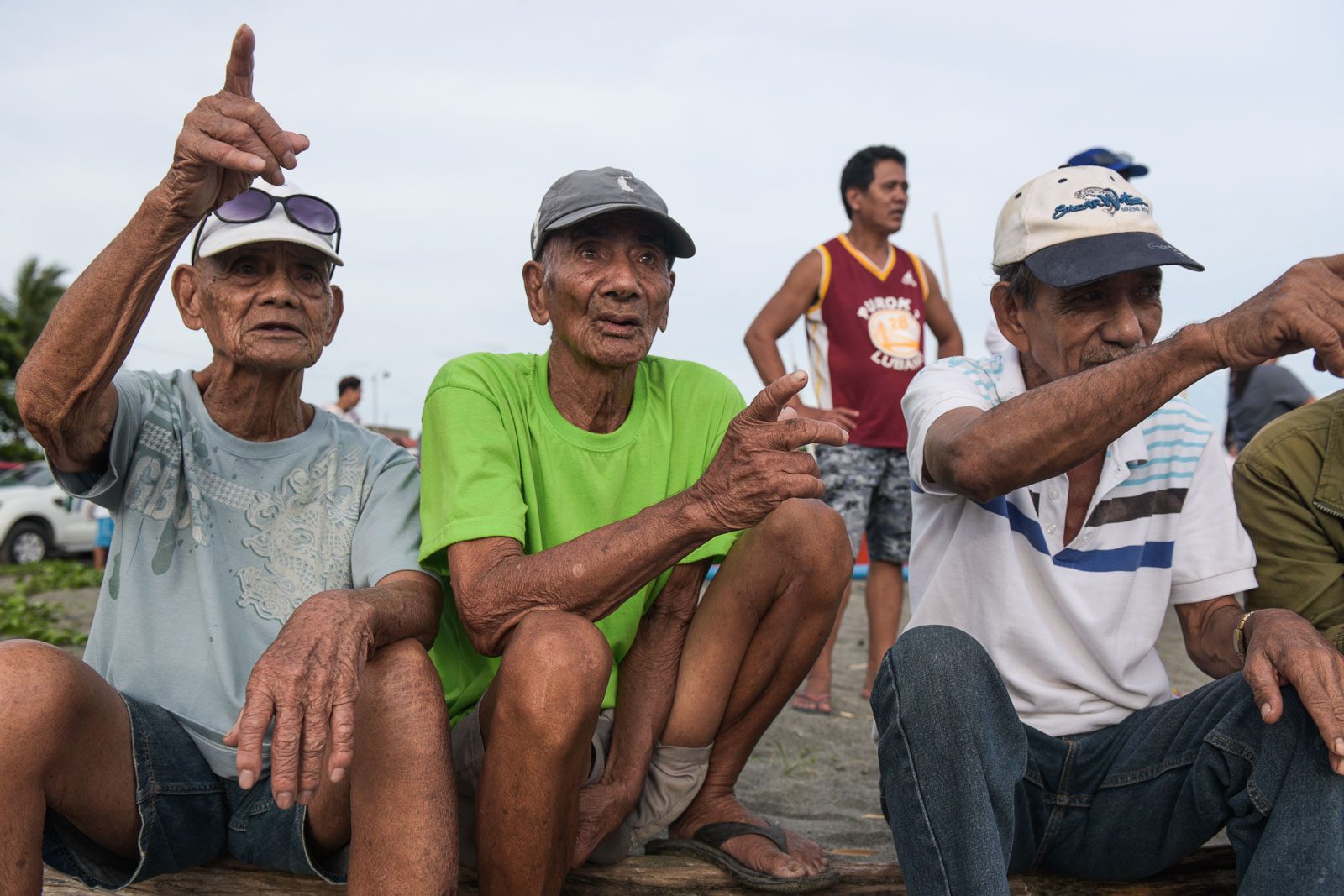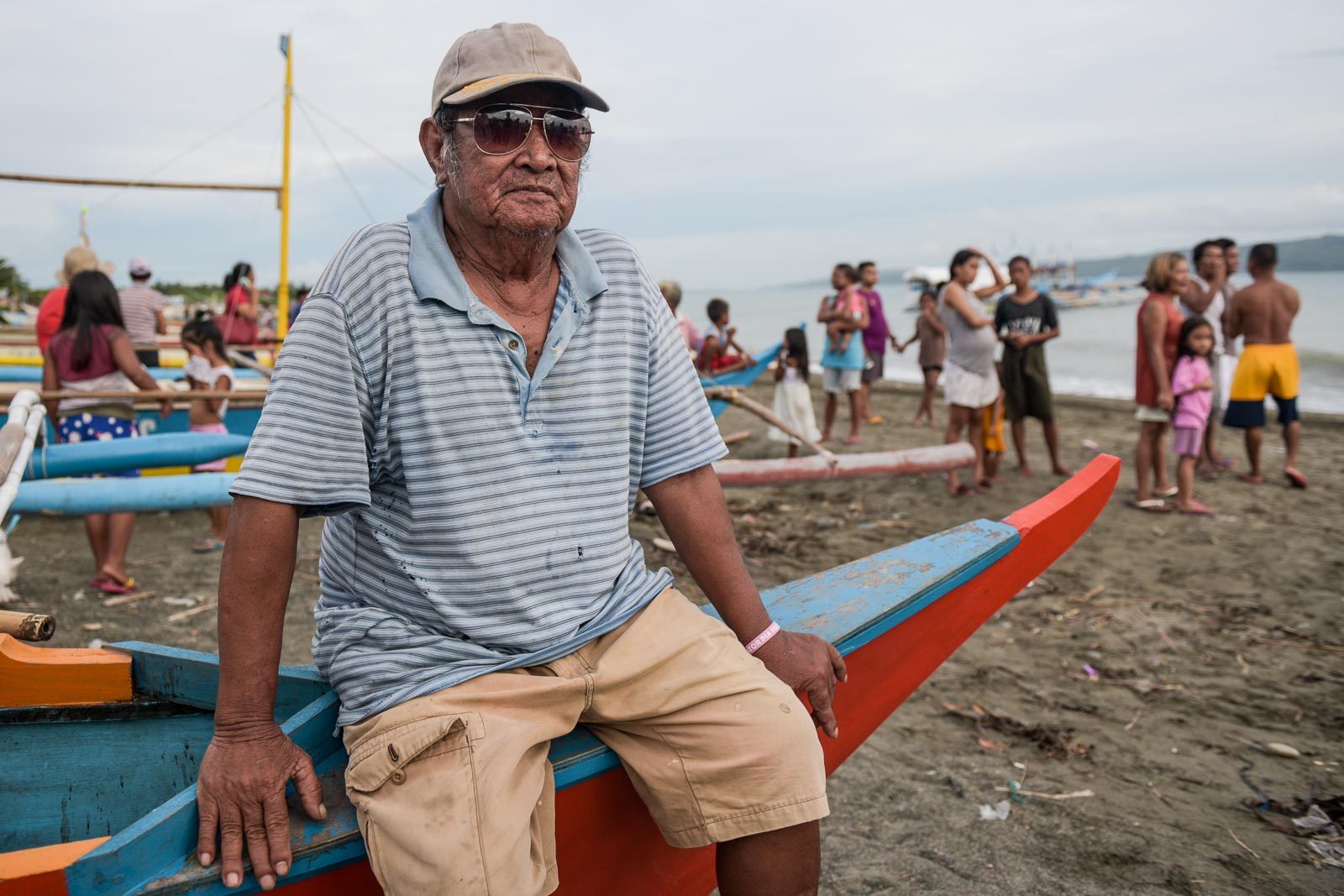SUMMARY
This is AI generated summarization, which may have errors. For context, always refer to the full article.

OCCIDENTAL MINDORO, Philippines – It took Freddy Montes almost a week aboard a small boat to reach Recto Bank (Reed Bank) with 6 other Filipino fishermen.
The long and dangerous sail, he said, was worth it. Recto Bank was a fisherman’s paradise.
“Tahimik ang Reed Bank, wala kang makikitang kahit anong taga-ibang bansa kundi kami lang din na tagarito sa Mindoro, taga-Palawan, iba’t ibang parte ng Pilipinas. Makakapal pa ang isda…. Pagdating namin doon, tatlong araw ng pangangawil, pauwi na kami,” Montes shared.
(In Reed Bank, you won’t see other people from other countries but us, us here from Mindoro, those from Palawan, and those from different parts of the Philippines. Fish were abundant. When we reach it, we stay for 3 days then we go home.)
He was in his 30s then.
Montes, now 59, added, “Noon ‘yun (That was then).”
Montes was among a handful of retired fishermen sitting on parked boats of San Jose, Occidental Mindoro, watching as the crew of Filipino vessel F/B Gem-Ver pulled their fishing boat closer to the shore after it was sunk by a Chinese fishing ship in Recto Bank then abandoned to the elements.
Recto Bank is an underwater reef formation that is rich in fish harvests, but is also said to contain huge reserves of oil and natural gas in the West Philippine Sea. It is coveted by China, even if it belongs to the Philippines based on an international ruling in 2016.
When China asserts its claim, it’s usually the Filipino fishermen who are imperiled. (READ: Recto Bank: Why China covets what belongs to the Philippines)
“Nalulungkot ka na ganoon ang nangyayari sa buhay ng mga mangingisda sa ngayon, na ang ating mismo, inagaw pa ng iba (It’s saddening that this is what’s happening to the lives of fishermen now, that what is ours is taken by another),” Montes said.
He added, “Dati walang ganoon, malayang malaya ka.” (Back then, this didn’t happen. We were free.)
Stories from the sea

“Hindi naman kami pinapaalis noon (We weren’t pushed out before),” said 91-year-old Florante Villenza, who experienced fishing in Recto Bank for 5 years in the 1950s.
He said he saw vessels from other countries when he voyaged to the area with his group, but they all observed courtesy as they shared the waters.
“Mga nakikita namin doon mga ano, Taiwanese, Vietnamese. Hindi pa gumagawi ang Chinese noon (We saw Taiwanese and Vietnamese fishermen then. Chinese fishermen have not ventured to the place yet),” shared 77-year-old Renato Toriana.
Wearing a smile from nostalgia, Villenza even recalled an incident where fellow Filipino fishermen “attacked” each other in jest as they searched for bounty together.
“May loko-loko nga noong nakapondo kami, hinagisan kami ng dinamita. Malayo nga lang. Mga Pilipinong mangingisda rin (There were fools who threw a dynamite at us while we were anchored. It was thrown far though. They were Filipino fishermen),” Villenza said.
Recto Bank as a seascape of abundance and camaraderie is a far cry from how younger fishermen now perceive the area after the assault of the Chinese vessel. (READ: Owner of sunken boat: I feel like we’re slaves of China)
“Merong nangyari, sa bagyo nagsagian ang bangka, nabangga. Pero aksidente, hindi akalain (There was something that happened, that boats collided with each other. But it was an accident, nobody saw it coming),” Villenza said.
The Chinese ship, meanwhile, had no excuse to call it an accident.
“May ilaw naman ‘yan, kumpleto ‘yan sa gamit. Ang mga China na ‘yan eh. Kita nila kung may bangka o wala. Nakaradar naman ‘yan (They have lights, they have complete equipment, those Chinese. They see whether there’s a boat or not. They have radars),” Montes said.
A problem of illegal fishing?

Back then, the fishermen said, they did not need to frequent Recto Bank because the fish used to be abundant in closer waters. They were only motivated to sail farther for days, they said, to get more.
“Sa dami ng mangingisda nauubos din (Because of a rise in fishing, the number of fish has been reduced),” said Toriana.
He added, “Marami kasing gumagamit ng illegal tulad ng paputok. Pati maliliit na isda papatayin (It’s because many also used illegal ways of fishing like dynamites. Even the small fish are killed).”
The problem of dynamite fishing is not unique to Occidental Mindoro. According to the Bureau of Fisheries and Aquatic Resources (BFAR) in 2014, they recorded 10,000 incidents of dynamite fishing a day in Philippine waters, diminishing fish stocks. (READ: PH oceans in crisis: The sad state of small fisherfolk)
Montes recalled that the government has initiated a crackdown on the illegal fishing methods. He said he hopes to see the same for foreign vessels who fish in Recto Bank.
Because it is within the Philippines’ exclusive economic zone, only Filipino fishermen can cast their nets in the area. Innocent passage for foreign vessels, meanwhile, is allowed.
“Hinuhuli tayo ng gobyerno tayo pag may mga fishing vessels tayo na nag-aano sa atin, pero pagdating ng oras at taga-ibang bansa ang pumasok, walang huli. ‘Yun ang nakapagtataka. ‘Yun ang nakakalungkot sa ngayon,” Montes said.
(We are arrested by our own government for illegal fishing, but when it comes to other countries entering and fishing, they have no arrests. That’s what’s surprising. That’s what’s saddening now.) – Rappler.com
Add a comment
How does this make you feel?
There are no comments yet. Add your comment to start the conversation.